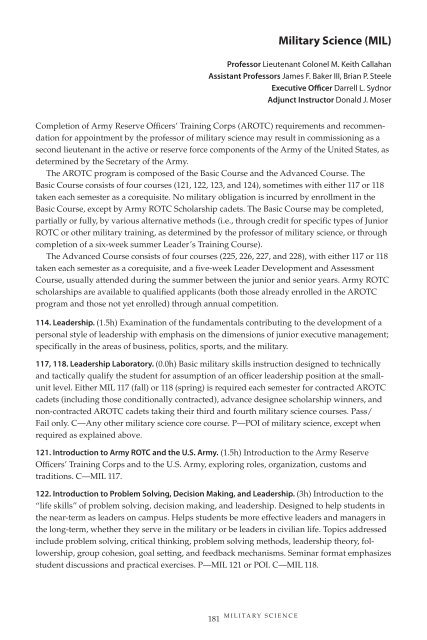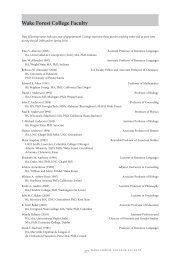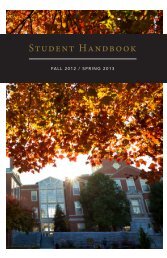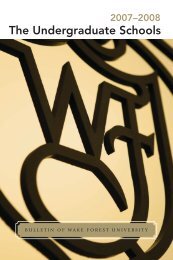theundergraduateschoo ls - Wake Forest University
theundergraduateschoo ls - Wake Forest University
theundergraduateschoo ls - Wake Forest University
You also want an ePaper? Increase the reach of your titles
YUMPU automatically turns print PDFs into web optimized ePapers that Google loves.
M I L I T A R Y S C I E N C E<br />
181<br />
Military Science (MIL)<br />
Professor Lieutenant Colonel M. Keith Callahan<br />
Assistant Professors James F. Baker III, Brian P. Steele<br />
Executive Officer Darrell L. Sydnor<br />
Adjunct Instructor Donald J. Moser<br />
Completion of Army Reserve Officers’ Training Corps (AROTC) requirements and recommendation<br />
for appointment by the professor of military science may result in commissioning as a<br />
second lieutenant in the active or reserve force components of the Army of the United States, as<br />
determined by the Secretary of the Army.<br />
The AROTC program is composed of the Basic Course and the Advanced Course. The<br />
Basic Course consists of four courses (121, 122, 123, and 124), sometimes with either 117 or 118<br />
taken each semester as a corequisite. No military obligation is incurred by enrollment in the<br />
Basic Course, except by Army ROTC Scholarship cadets. The Basic Course may be completed,<br />
partially or fully, by various alternative methods (i.e., through credit for specific types of Junior<br />
ROTC or other military training, as determined by the professor of military science, or through<br />
completion of a six-week summer Leader’s Training Course).<br />
The Advanced Course consists of four courses (225, 226, 227, and 228), with either 117 or 118<br />
taken each semester as a corequisite, and a five-week Leader Development and Assessment<br />
Course, usually attended during the summer between the junior and senior years. Army ROTC<br />
scholarships are available to qualified applicants (both those already enrolled in the AROTC<br />
program and those not yet enrolled) through annual competition.<br />
114. Leadership. (1.5h) Examination of the fundamenta<strong>ls</strong> contributing to the development of a<br />
personal style of leadership with emphasis on the dimensions of junior executive management;<br />
specifically in the areas of business, politics, sports, and the military.<br />
117, 118. Leadership Laboratory. (0.0h) Basic military skil<strong>ls</strong> instruction designed to technically<br />
and tactically qualify the student for assumption of an officer leadership position at the smallunit<br />
level. Either MIL 117 (fall) or 118 (spring) is required each semester for contracted AROTC<br />
cadets (including those conditionally contracted), advance designee scholarship winners, and<br />
non-contracted AROTC cadets taking their third and fourth military science courses. Pass/<br />
Fail only. C—Any other military science core course. P—POI of military science, except when<br />
required as explained above.<br />
121. Introduction to Army ROTC and the U.S. Army. (1.5h) Introduction to the Army Reserve<br />
Officers’ Training Corps and to the U.S. Army, exploring roles, organization, customs and<br />
traditions. C—MIL 117.<br />
122. Introduction to Problem Solving, Decision Making, and Leadership. (3h) Introduction to the<br />
“life skil<strong>ls</strong>” of problem solving, decision making, and leadership. Designed to help students in<br />
the near-term as leaders on campus. Helps students be more effective leaders and managers in<br />
the long-term, whether they serve in the military or be leaders in civilian life. Topics addressed<br />
include problem solving, critical thinking, problem solving methods, leadership theory, followership,<br />
group cohesion, goal setting, and feedback mechanisms. Seminar format emphasizes<br />
student discussions and practical exercises. P—MIL 121 or POI. C—MIL 118.






